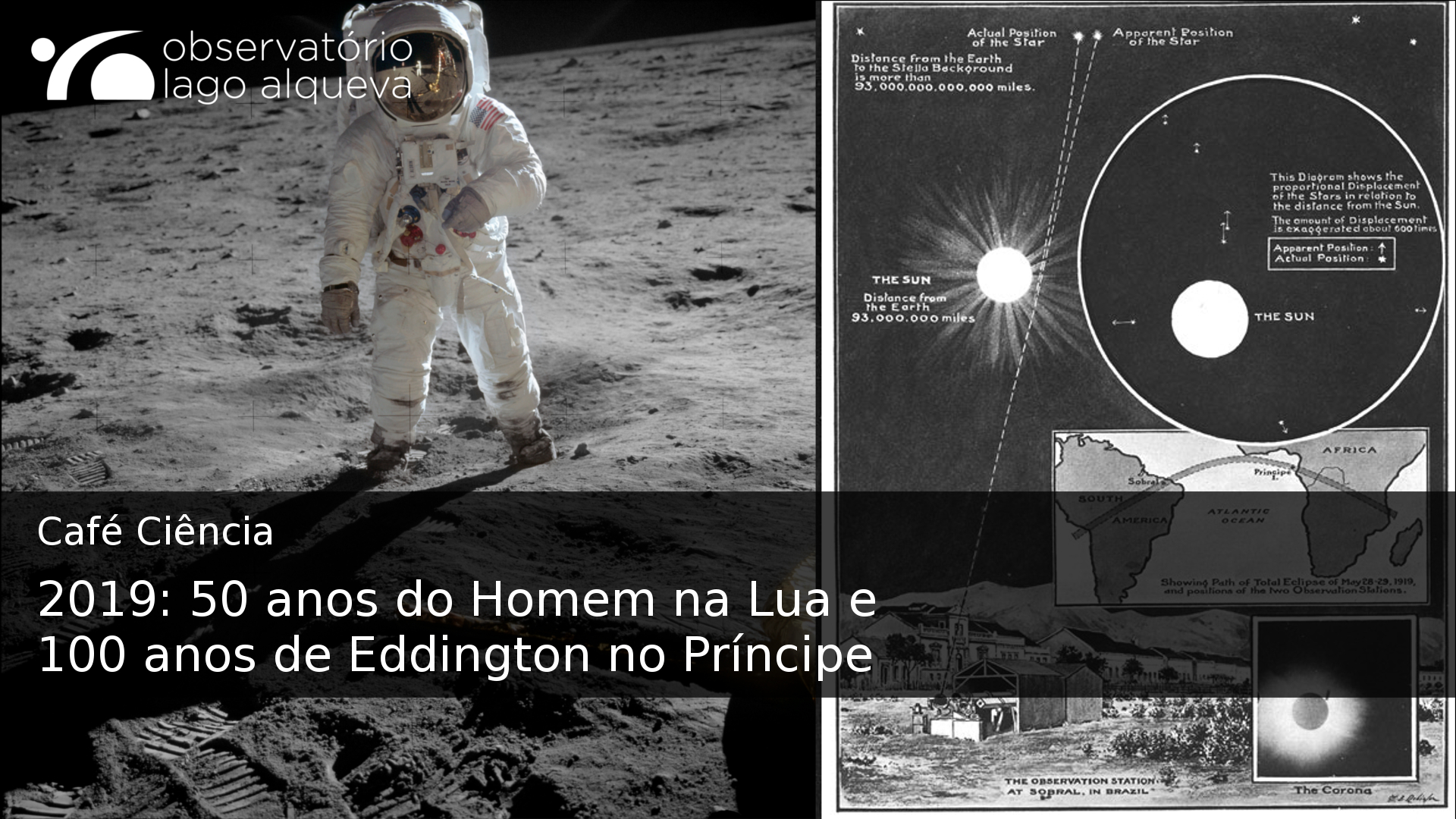
2019: 50 years of the Man on the Moon and 100 years of Eddington at Prince
José Saraiva, Joana Latas and Rosa Doran.
In 2019 we celebrate important landmarks to the construction of our knowledge of the Universe. This will be the year in which will be celebrated the 50 years of the arrival of man on the Moon, the 100 years of the existence of the Astronomical Union, the 100 years of the observations that allowed the verification of the General Theory of Relativity among other important events.
On this Science Café we intend to outline two of these events: the 50 years of the first time man walked on the Moon and the centenary of the solar eclipse of May 29th 1919, which led Eddington to the then remote island of Prince, on which have been done the observations that allowed to experimentally validate the General Theory of Relativity of Einstein.
The space age begun on 1957. 12 years later (but only eight years after the first man in space!), the first astronauts walked on the surface of our natural satellite. To achieve such a goal, it was necessary to develop a vast set of capabilities: build machines, study trajectories and surfaces, training man to fly in space and develop several tasks of technical and scientific order. In only twelve years. Where did all that knowledge came from?
During the solar eclipse of May 29th 1919, in an expedition that resulted from a joint organization from the Royal Astronomical Society and the Royal Society, were recorded photographs that allowed to experimentally confirm the General Theory of Relativity. The expedition was led by the famous astronomer Arthur Eddington and had as a central stage the island of Prince. In a Europe still in the wake of the First World War, the ambition, the persistence and curiosity of this English scientist was crucial for the success of a theory from a German scientist.
The adventure of Mankind in the scientific advances and developments is continuous. The youngsters that are today in school will have their chance of contributing to new and bold steps on this path. Their current teachers have a key role: show them were they can reach.
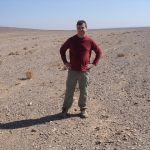 José Saraiva has a degree in Geology by University of Coimbra and a Master Degree in Georesources by the IST. It was a member of CVRM and also of CERENA; investigation centers of IST, where he has developed works on the area of planetary surface images analysis, mostly of Mars. He is a member of NUCLIO, involved in several projects of science outreach and education.
José Saraiva has a degree in Geology by University of Coimbra and a Master Degree in Georesources by the IST. It was a member of CVRM and also of CERENA; investigation centers of IST, where he has developed works on the area of planetary surface images analysis, mostly of Mars. He is a member of NUCLIO, involved in several projects of science outreach and education.
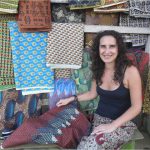 Joana Latas has a degree in Mathematics and Computation Sciences by the University of Évora and a Master Degree in Educational Sciences by the same university. At the moment, she is developing research in the scope of a PhD on History of Sciences and Scientific Education, that she is attending at Coimbra University. After several years of experience as a mathematics teacher in Portugal, Guinea-Bissau and São Tomé e Príncipe, she is currently involved in projects of education and scientific dissemination as a member of the NUCLIO.
Joana Latas has a degree in Mathematics and Computation Sciences by the University of Évora and a Master Degree in Educational Sciences by the same university. At the moment, she is developing research in the scope of a PhD on History of Sciences and Scientific Education, that she is attending at Coimbra University. After several years of experience as a mathematics teacher in Portugal, Guinea-Bissau and São Tomé e Príncipe, she is currently involved in projects of education and scientific dissemination as a member of the NUCLIO.
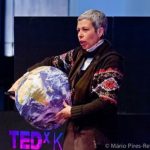 Rosa Doran, has a degree on Physics by the Pontifícia Universidade Católica in São Paulo, Brazil; Master Degree on High Energies and Gravitation by the Faculty of Sciences of University of Lisbon and an ongoing PhD at Coimbra University, in the area of science teaching. President of NUCLIO – Núcleo Interactivo de Astronomia (Astronomy Interactive Nucleus), a non-lucrative association and ONG for the development, dedicated to outreach and teaching of sciences. At international level, exerts functions of vice-president of the executive council of the Global Hands-on Universe Association, an organization dedicated to implement scientific research on the class room. Chair of the Galileo Teacher Training Program, one of the legacies of the 2009 International Year of Astronomy. Vice-president of the education panel of COSPAR (Commission for Space Research). Co-Coordinator of the Portuguese speaking astronomy group for the development of the International Astronomical Union.
Rosa Doran, has a degree on Physics by the Pontifícia Universidade Católica in São Paulo, Brazil; Master Degree on High Energies and Gravitation by the Faculty of Sciences of University of Lisbon and an ongoing PhD at Coimbra University, in the area of science teaching. President of NUCLIO – Núcleo Interactivo de Astronomia (Astronomy Interactive Nucleus), a non-lucrative association and ONG for the development, dedicated to outreach and teaching of sciences. At international level, exerts functions of vice-president of the executive council of the Global Hands-on Universe Association, an organization dedicated to implement scientific research on the class room. Chair of the Galileo Teacher Training Program, one of the legacies of the 2009 International Year of Astronomy. Vice-president of the education panel of COSPAR (Commission for Space Research). Co-Coordinator of the Portuguese speaking astronomy group for the development of the International Astronomical Union.
Support:
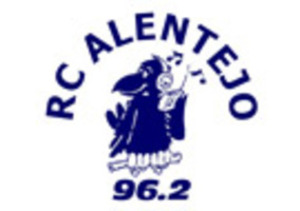 |
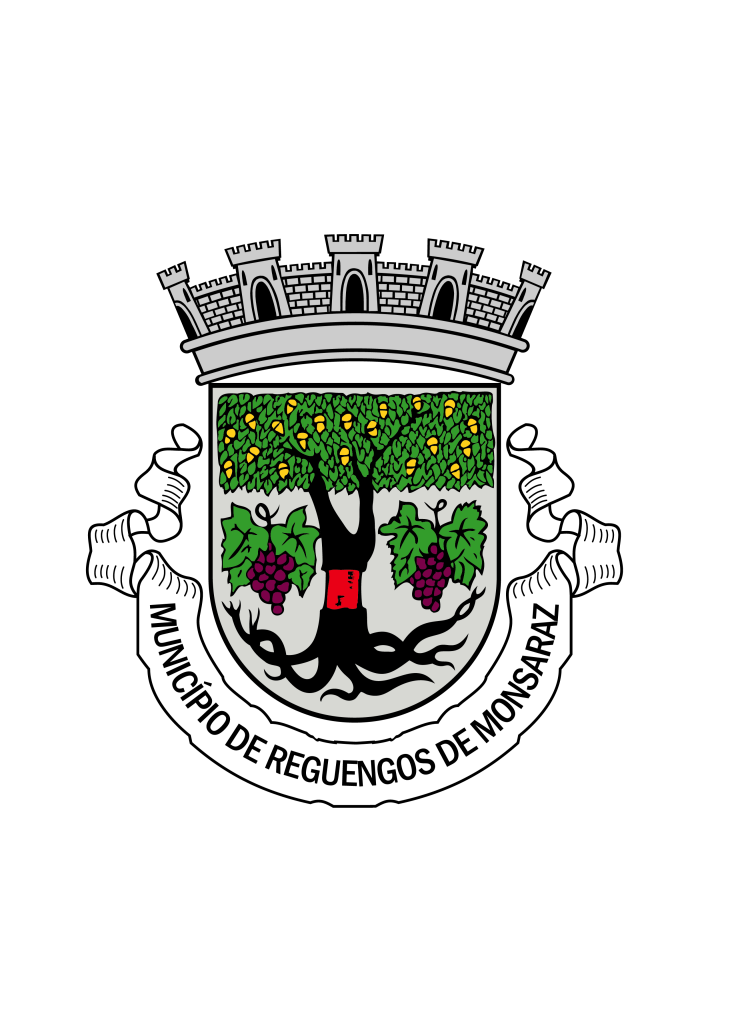 |
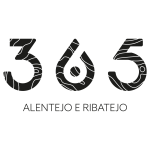 |
 |
||